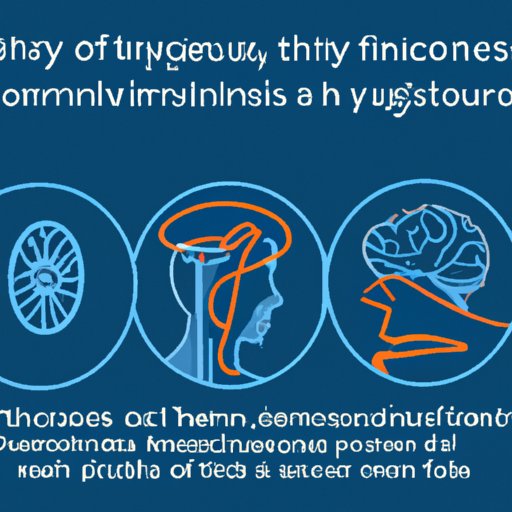
I. Introduction
Functional symptoms, also known as psychogenic or somatic symptom disorders, refer to physical symptoms that have no apparent medical explanation, even after thorough evaluations and tests. Despite being a common medical condition, functional symptoms are often misunderstood, misdiagnosed, or stigmatized. This article explores what neurologists really think about functional symptoms. It aims to provide insights into the myths, truths, and challenges that neurologists face when dealing with patients with functional symptoms. Furthermore, it provides a comprehensive guide and expert advice for individuals who experience functional symptoms and seek professional help.

II. 7 Surprising Insights on Functional Symptoms from Neurologists
When it comes to functional symptoms, neurologists acknowledge that there are many misconceptions or myths surrounding it. Here are seven surprising insights that neurologists encounter:
Myth 1: Functional symptoms are imaginary or made up.
Many patients with functional symptoms feel invalidated when their symptoms are not considered “real.” However, neurologists acknowledge that functional symptoms are indeed real and can be debilitating. Neurologists differentiate between organic and functional symptoms, the former being caused by a disease or injury, whereas the latter by psychological or emotional factors.
Myth 2: Functional symptoms are not treatable or curable.
Neurologists emphasize that functional symptoms are treatable, and they often rely on a multimodal approach that includes cognitive-behavioral therapy, physical therapy, and medication. The goal is not to eliminate the symptoms, but to manage them and improve the patient’s quality of life.
Myth 3: Functional symptoms are primarily caused by stress or anxiety.
Although stress and anxiety can contribute to functional symptoms, neurologists state that there are multiple causative factors, including trauma, personality traits, and environmental factors. Neurologists also emphasize that individuals with functional symptoms can experience a range of emotions, not just stress or anxiety.
Myth 4: Functional symptoms are only common in women.
Functional symptoms can affect anyone, regardless of gender, age, or culture. Neurologists emphasize that functional symptoms are not a reflection of weakness or a personality disorder, nor are they more prevalent in women.
Myth 5: Functional symptoms are not related to other medical conditions.
Functional symptoms can coexist with other medical conditions, and neurologists emphasize the importance of ruling out other possible causes before diagnosing functional symptoms. Even if the symptoms are functional, proper medical evaluations can help diagnose and treat any underlying conditions that may exacerbate the symptoms.
Myth 6: Functional symptoms can only be diagnosed through invasive procedures or imaging tests.
Although imaging tests and invasive procedures can rule out organic causes, neurologists acknowledge that functional symptoms can also be diagnosed through thorough medical evaluations, symptom questionnaires, and discussions with the patient.
Myth 7: Functional symptoms are not significant compared to other medical conditions.
Functional symptoms can significantly affect a person’s life, relationships, and ability to work. Neurologists emphasize the importance of taking functional symptoms seriously and providing comprehensive care for patients.
III. The Truth About Functional Symptoms According to Neurologists
Functional symptoms are not a diagnosis, but rather a term used to describe a set of symptoms that have no organic or apparent medical explanation. Neurologists believe that functional symptoms can be caused by multiple factors, including psychological, social, and environmental stressors, as well as underlying medical conditions that need to be ruled out. Neurologists aim to provide comprehensive care for patients with functional symptoms, including referral to psychiatrists, cognitive-behavioral therapies, and other supportive measures, depending on the patient’s needs and preferences.
To illustrate this point, neurologists share case studies of patients who experienced functional symptoms that improved with appropriate treatment. For example, a patient who experienced numbness and weakness in her legs was diagnosed with a functional gait disorder. After several sessions of cognitive-behavioral therapy and physical therapy, the patient’s symptoms improved significantly, and she regained her mobility and independence.
Neurologists emphasize the importance of collaboration and communication between patients and health care providers. Patients with functional symptoms may feel frustrated or invalidated by the lack of apparent medical explanations, but proper diagnosis and treatment can help them understand and manage their symptoms better.
IV. Neurologists Reveal Their Thoughts on Functional Symptoms
Dealing with patients with functional symptoms can be challenging for neurologists. Patients may experience fear, frustration, or skepticism, and it can be difficult to establish trust and communication. Neurologists reveal their thoughts and feelings about patients with functional symptoms and provide insights into how they can effectively communicate with them.
Neurologists emphasize the importance of active listening, empathy, and validation. Patients with functional symptoms need to feel heard and validated, even if their symptoms are not immediately understood. Neurologists also emphasize the importance of education and reassurance, providing clear explanations about functional symptoms, and setting realistic expectations for treatment and management.
Neurologists share tips and strategies for communication, such as using patient-centered language, avoiding medical jargon, and acknowledging the patient’s cultural and personal factors. They also emphasize the importance of keeping an open mind and being willing to collaborate with other healthcare providers to provide comprehensive care for patients with functional symptoms.
V. Unpacking the Stigma: Neurologists Discuss Functional Symptoms
Stigma can be a significant barrier to patients with functional symptoms seeking proper diagnosis and treatment. Patients with functional symptoms may experience skepticism, blame, or invalidation from their family members, friends, or healthcare providers. Neurologists acknowledge the existence of stigma related to functional symptoms and provide insights into how they aim to fight it.
Neurologists emphasize the importance of patient advocacy and education. They aim to raise awareness among healthcare providers about the prevalence and diversity of functional symptoms and to provide education and resources to patients. They also work to reduce the stigma by providing culturally-sensitive care and engaging in open communication with patients.
Neurologists advocate for a multidisciplinary approach to functional symptoms, including collaboration with psychiatrists, physical therapists, and social workers, to provide comprehensive, integrated care for patients. They believe that reducing stigma and providing comprehensive care can improve patient outcomes and quality of life.
VI. Expert Opinion: What Neurologists Really Think of Functional Symptoms
Neurologists strive to provide the best possible care for patients with functional symptoms, but they also face challenges and limitations. Researchers continue to study the underlying causes of functional symptoms, and neurologists aim to stay updated on the latest research and treatment approaches.
Neurologists share their opinions and insights on the current state of research on functional symptoms and the challenges they face. They acknowledge that functional symptoms are not yet completely understood and require more research and funding. They also emphasize the need for education and training for healthcare providers on functional symptoms and the importance of patient-centered care.
Furthermore, neurologists emphasize the importance of a patient-centered approach to functional symptoms, recognizing that every patient has a unique experience and set of symptoms. Neurologists aim to create a safe and supportive environment for patients to share their experiences and achieve a proper diagnosis and treatment.
VII. A Comprehensive Guide to Understanding Functional Symptoms from a Neurologist’s Perspective
Patients who experience functional symptoms may feel overwhelmed, frustrated, or confused. A comprehensive guide to understanding functional symptoms from a neurologist’s perspective can help patients navigate the process of diagnosis and treatment.
The guide should include the following steps:
- Step 1: Understand what functional symptoms are.
- Step 2: Rule out other medical conditions.
- Step 3: Seek professional help.
- Step 4: Collaborate with healthcare providers.
- Step 5: Learn about cognitive-behavioral therapy and other treatments.
- Step 6: Practice self-care and symptom management.
The guide should provide resources, such as websites, articles, and support groups, for patients who seek further information or support.
VIII. Myths vs. Facts: Separating Truth from Fiction on Functional Symptoms in Neurology
After discussing the myths, truths, and insights about functional symptoms from a neurologist’s perspective, it’s important to summarize the main points and takeaways.
Here are some common myths about functional symptoms:
- Functional symptoms are imaginary or made up.
- Functional symptoms are not treatable or curable.
- Functional symptoms are primarily caused by stress or anxiety.
- Functional symptoms are only common in women.
- Functional symptoms are not related to other medical conditions.
- Functional symptoms can only be diagnosed through invasive procedures or imaging tests.
- Functional symptoms are not significant compared to other medical conditions.
Here are the facts:
- Functional symptoms are real and can be debilitating.
- Functional symptoms are treatable through a multimodal approach.
- Functional symptoms can have multiple causes, including medical conditions.
- Functional symptoms can affect anyone.
- Functional symptoms need to be diagnosed through thorough medical evaluations.
- Functional symptoms can be diagnosed through discussions with the patient.
- Functional symptoms can significantly affect a person’s life, relationships, and work.
As a final message of hope and encouragement, it’s essential to acknowledge that functional symptoms can be managed with proper diagnosis and treatment. Patients with functional symptoms should seek professional help, collaborate with healthcare providers, and practice self-care. Neurologists and other healthcare providers should continue to raise awareness, reduce stigma, and provide comprehensive care for patients with functional symptoms.
IX. Conclusion
Functional symptoms may be challenging to understand and diagnose, but neurologists believe that they are not imaginary or insignificant. Functional symptoms are real, treatable, and caused by multiple factors, including underlying medical conditions that need to be ruled out. Neurologists aim to provide the best possible care for patients with functional symptoms, such as active listening, empathy, and comprehensive care.




